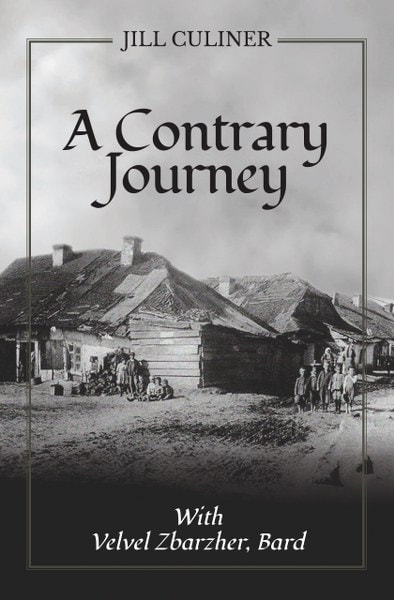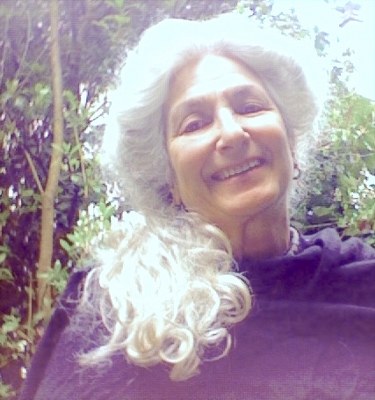A Contrary Journey
with Velvel Zbarzher, Bard
by Jill Culiner
Genre: Nonfiction Biography, History, Travel
Culiner's intrepid pursuit of the elusive troubadour and the lost world from which he emerged enriches us with a double depiction of the turbulent times and places of the bard's era and the galloping commercialization of our own. Like a chef who manages to document great recipes before they disappear, Culiner serves us an utterly delicious feast of flavours we do not want to lose.
Robin Roger, writer, reviewer, Associate Publisher, New Jewish Press 2016-18
Invited by Culiner to join her travels to find Velvel was a gift in isolated pandemic times. Part history, part biography and part literature, the writing poetically transfixed. Train rides, villages, and Velvel's life move between magical realism and extraordinary insights into Jewish history generally missing in heritage tourism.
Daniel J Walkowitz, Professor of History Emeritus, Professor of Social & Cultural Analysis Emeritus New York University, author of The Remembered and Forgotten Jewish World
A captivating romance, a thrilling mystery, a fascinating tour back and forward in time, and so much more. Culiner takes us out of the contemporary fast-paced, digital society and superbly redraws the varied contours of the shtetls of Eastern European countries of yore via one remarkable itinerant Jewish existence. The book brilliantly brings back to life the unjustly forgotten Hebrew poet and Yiddish melodrama author, Velvel Zbarzher, a significant precursor of Yiddish theatre that moved from Galicia to Romania, the Russian Pale of Settlement, Austria, and finally Turkey. A breathtaking read!
Dana Mihailescu, Associate Professor of American Studies, University of Bucharest
What a beautiful book! The writing is clear and direct, the subject matter is interesting and important, and the characters are lively and realistically portrayed. In short, it's a good piece of reporting, and was entirely successful in wafting me to another time and place.
Barrington James, former foreign correspondent for the Herald Tribune and UPI, author of The Musical World of Marie Antoinette
The Old Country, how did it smell? Sound? Was village life as cosy as popular myth would have us believe? Was there really a strong sense of community? Perhaps it was another place altogether.
In 19thc Eastern Europe, Jewish life was ruled by Hasidic rebbes or the traditional Misnagedim, and religious law dictated every aspect of daily life. Secular books were forbidden; independent thinkers were threatened with moral rebuke, magical retribution and expulsion. But the Maskilim, proponents of the Haskalah or Jewish Enlightenment, were determined to create a modern Jew, to found schools where children could learn science, geography, languages and history.
Velvel Zbarzher, rebel and glittering star of fusty inns, spent his life singing his poems to loyal audiences of poor workers and craftsmen, and his attacks condemning the religious stronghold resulted in banishment and itinerancy. By the time Velvel died in Constantinople in 1883, the Haskalah had triumphed and the modern Jew had been created. But modernisation and assimilation hadn't brought an end to anti-Semitism.
Armed with a useless nineteenth-century map, a lumpy second-hand coat, and an unhealthy dose of curiosity Jill Culiner trudged through the snow in former Galicia, the Russian Pale, and Romania searching for Velvel. But she was also on the lookout for a vanished way of life in Austria, Turkey and Canada.
This book, chronicling a forgotten part of Jewish history, follows the life of one extraordinary Jewish bard, and it is told with wry humour by award-winning Canadian writer Jill Culiner.
Falling snow obscures all. Surely no one will travel in such a blizzard. Even huge, snow-covered stray dogs curl desperately against the walls and doors of the central bus station. Take a look at the rusty mini-buses with threadbare tires in the station yard: those motorized tin cans will never risk ice-covered, potholed roads.
I’m wrong, of course. I’ve spent too much time in places where people are easily upset by weather. This is Ukraine; snow is normal. The unheated can I board joins other cans, cars, horse-drawn carts, and off we go, gliding along as if nothing unusual is going on. Even the driver is not in the least troubled by high drifts. As we slalom merrily, left, right, centre, left, half-spin, centre again, he chats amiably to the woman sitting just behind him. Further obscuring the view, a special metal attachment just above the windscreen allows for his impressive collection of good luck tchotchkele: toy animals—two bears, a bunny, a puppy—a bouncing crucifix, an icon, several splendid sprays of plastic flowers.
Svyniukhy (Svinich) is now called Privetnoye, and it’s some thirty kilometres away. On these bad roads, the trip there will easily take three or four hours, although I’m not certain about much of anything since I’ve also lost my modern road map and I can’t understand anyone anyway. Outside, white hills swell gently, and despite the snowstorm, a heavy mist makes time inconsequential. Perhaps it’s a curtain of sorts, one through which I must pass in search of the past. Yes, the countryside does resemble that of Michigan or Ontario—my grandmother said it would. Still, there’s something else out there, something quite unlike the New Country. Although Stalin ordered the collectivisation of smallholdings and the ploughing up of boundary brush, the traces of long strips, as narrow as the medieval past, are still stamped into the black earth by those long-gone serfs’ toil. Old mud roads are here too, just wide enough for carts and horses, heading toward villages hidden by hills and coppices. And, everywhere you look, those peasant women are there again, drab, bulky, lumbering homeward.
People climb into and out of the tin can at strange places, without dwellings, signs, or indications of any sort. Sometimes we pause in tiny villages with today’s usual jumble: ruined old houses with tin roofs; beautiful wooden terraces ruined by polyvinyl chloride siding; ugly new shops in cement; brick bungalows lacking style and charm but with effective heating; beautifully tended old houses of adobe with small double windows and, sometimes, a sculpted wooden entry. What I wouldn’t give to be invited into a few of those for a gawk.
The driver, exasperated that I speak no Ukrainian, lets me know it, turning, looking at me pointedly, sneering, making snide comments to smirking fellow passengers, all of them flat-faced, blue-eyed folk. Let him have his fun, I don’t mind in the least. I’m taking in the sight of the men and women trudging through the snow with straw baskets containing flapping chickens or heavy sacks. These tree-lined roads, carts and horses, unpaved mud streets, are visions from another time: yes, I have reached the other side of the curtain. What will I find in Svinich? Will I see the inn? Is there still a bench out in front? What about the river?










No comments:
Post a Comment